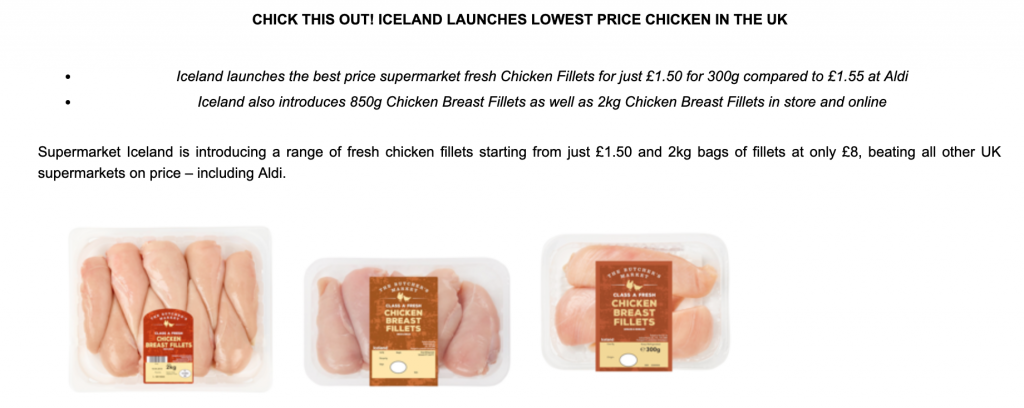Iceland has launched what it claims are the cheapest supermarket chicken breasts – and I’m not happy.
Late last week a press release popped into my inbox. The title read “Chick this out! Iceland launches lowest priced chicken in the UK”. You can see some of it in the image below.

So what’s the problem? Well, although I’m often celebrating saving money, I don’t think supermarkets should be shouting about the lowest price chicken.
Really cheap chicken can only mean one thing – poor welfare. And it could be a signifier that it’s lesser quality meat too, perhaps pumped full of water. Yes, ok it could be a subsidised loss leader to get people through the doors. But not to an extent that mitigates my concerns.
And according to the RSPCA, most people don’t want this either. Eight out of 10 people think the chicken they are buying is higher welfare – but it’s not.
Animal and bird welfare
To sell chicken at this price must surely mean these birds will be enduring horrific conditions. It’s not just the overly crowded pens with little or no natural light, which are both pretty horrendous.
The RSPCA has further concerns about the consequences of intensive farming of the birds. Many are genetically selected for faster than natural growth which means the chickens can’t walk or stand, and even suffer heart attacks.
And intensively farmed birds aren’t likely to have been slaughtered to any sort of humane standard.
The scale of the problem
Chicken is the UK’s most popular meat, with one billion chickens reared each year. Yet, according to this infographic from the British Poultry Association, less than 4.5% of UK reared chicken is free-range or organic. That means there’s a huge amount of chicken that’s potentially raised in these shocking conditions.

What supermarkets should be doing
Rather than trying to find the cheapest chicken, I think Iceland – and the other supermarkets – should be trying to find a more sustainable way to give us ethical and affordable meat.
Instead most are actively making it harder for consumers to find and afford it. Labels can mislead people into thinking the chickens are living on an idyllic farm, or just that there are any kind of humane conditions. The RSPCA even found higher-welfare meat positioned away from shoppers’ eyelines and rarely in promotions.
And by offering even cheaper intensively farmed chicken, they are also making the price difference between it and free-range and organic chicken even wider.
What Iceland says
I was surprised to see this come from Iceland because they made such a strong stance on palm oil and deforestation at Christmas with their banned Greenpeace advert, which focussed on saving a sad cartoon orangutan. Are they saying they only care about animals they don’t sell in a party platter?
It’s unfair to single them out though – I’ve just picked out Iceland for actively trying to promote the cheapest chicken. The majority of chicken you buy in a supermarket isn’t going to have been raised in the conditions you imagine.
I wanted to let Iceland respond to this. Here’s what they said about the welfare conditions of their chicken.
“We offer a range of poultry products across our chilled and frozen ranges, with tiered price points to appeal to all of our customers. We work closely with our suppliers and have reduced the level of margin on our lowest priced chicken in order to offer these lines at such low prices.
We are committed to offering our customers choice, and alongside our ‘lowest priced chicken in the UK’ we offer slightly higher tier products which are Red Tractor Assured, for example. All of our suppliers must adhere to our strict animal welfare policies and we work with them to ensure high standards based on the ‘Five Freedoms’ endorsed by the Farm Animal Welfare Council.”
Personally, this doesn’t make me any more confident about the standards used to farm the chickens, and I wouldn’t buy any chicken from Iceland. But the same goes for any other low-welfare chicken at most supermarkets.
So what can you do?
How to be ethical and pay less for your chicken and other meat
For most of us, we can’t afford to live a life that’s 100% ethical. You need to pick your battles – and I think better conditions for chicken is one which can be fought. Here are just some of the ways you can eat higher-welfare poultry and other meat without breaking the bank.
Look for RSPCA Assured, free-range or organic chicken
The only labels you can trust are RSPCA Assured and Soil Association Organic. These are certifications which require the farms to adhere to certain standards. And though free-range isn’t certified, it will be fine too.
Don’t be fooled by Red Tractor logos – something Iceland and others offer on some poultry. These are the minimum legal animal welfare and food safety standards – which in reality doesn’t mean much if you are concerned about the life an animal led. Jamie Oliver has said he wouldn’t feed his kids anything labelled Red Tractor.
Only buy your chicken from certain supermarkets
If free-range or organic prove too expensive – and they can be – then you should buy your meat from supermarkets which have their own higher welfare policy. Though they won’t be at the same level as RSPCA Assured, they won’t be far off.
I tend to buy my meat from two supermarkets. Waitrose’s basic “essential” fresh chicken meets RSPCA standards and Marks & Spencer has committed to meet higher standards across all poultry by 2026 (it already does a lot better than most with the bulk of its fresh chicken).
One to avoid though would be Tesco, which according to this Huffington Post article sells more intensively farmed chicken than Asda and Morrisons combined.
Choose cheaper cuts
You can bring down the cost of your chicken if you switch breasts for thighs, which are generally cheaper and tend to have more flavour and moisture than chicken breasts. Skin-on will cost less, you just need to remove it.
Use the whole bird
If you’re buying a whole chicken, don’t waste any of it. Get into the carcass and pick out all the bits to make sure your money and meat go further. You can even go one further and use the carcass to make chicken stock for use in soups and gravy.
Raid the reduced shelves
I do all the above, but my biggest savings are down to picking up some reduced to clear bargains. I’ll separate the packs into portions and then put them in my freezer. This makes shopping more affordable at supermarkets such as Waitrose or M&S where I know the standards are higher even if I’m not able to find free-range or organic.
Eat less of it
A few generations ago a chicken was a treat. Now it’s a daily meal in some households. Realistically the price of ethical chicken means most of us will have to eat less of it. But that’s no bad thing either – there’s a whole other article that could be written about farming and its impact on the environment, particularly cattle.
Lobby the supermarkets to change
Finally, you can sign up to the RSPCA’s Better Chicken Commitment campaign, which emails Tesco a message asking them to improve their standards.






So, do you actually have any solid evidence to support your claim that Iceland chicken comes from battery farming procedures? Or is this all speculative data? I’ve just had a debate about this topic and been told heavily that because chicken is cheap from Iceland it must be farmed unethically. But again, do you have solid concrete evidence or just theory?
Hi Sam. There are set conditions for ethical chicken. Certified organic has the highest welfare standards, then free range, then freedom foods (RSPCA certified). Some supermarkets, such as Waitrose and M&S have their own higher welfare standards which are roughly level with Freedom Food. These latter ones aren’t perfect but more realistic in terms of mass farming while still respecting an animals behaviours. Iceland and other supermarkets do not. Though the standards these birds are farmed at will vary, they’re not farmed in conditions that anyone would consider respectful of animal welfare.
I don’t agree its right to assume that cheaper chicken has been reared in unacceptable conditions. There are EU Regulations in place concerning intensively reared chickens, and incidently for egg-laying chickens too. Iceland has explained in their response that they achieved their lower prices by cutting (profit) margins, so why assume otherwise? Effectively saying you don’t believe they are adhering to their own strict welfare policies. I have noticed elsewhere that some people have said that their cheap chicken breasts are not very good quality but I haven’t tried them myself so I can’t comment.
Great article – completely agree with you Andy. I buy organic chicken from either M&S or Waitrose. It is also very worrying when eating out, that most places probably use low welfare, cheap chicken. Personally, I don’t mind paying more for high welfare, organic products.
Ethics can get very thorny, so gets hard to marry up with something absolute like ‘cheapest’, but good on you for trying (hope that doesn’t come across as condescending).
Absolutely loved this article Andy – so well written and sensible.
I think it’s amazing that you’re covering things like this and not just banging on about what’s cheap not matter what. I too am concerned about animal welfare standards, but also about the healthiness of intensively farmed meat. As a family we’re eating less too, but I now tend to buy 1 organic chicken every week or two (which is about £10+) but liked you’ve said I make it last a few meals. My family also now see having chicken as a treat and not an every day occurrence, and we eat more cheap and healthy veg instead.